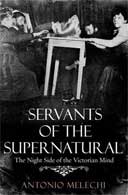
Servants of the Supernatural: The Night Side of the Victorian Mind
by Antonio Melechi
320pp, William Heinemann, £20
At about the time that God was getting ready to leave Victorian England by the front door, a whole host of rustling, moony-eyed creatures were tapping noisily at the back. With orthodox faith beginning to fray from the 1830s (Darwin may have speeded things up, but he didn't invent doubt), ordinary people were desperate to have something in which to believe. If man was no longer made in the Almighty's image, and Heaven could no longer be pictured as a place where you sprouted wings and lived for ever, then what was left? Into this aching emptiness tumbled a rag-bag of wild ideas and way-out practices, including mesmerism, phrenology and, most controversially of all, spiritualism.
Some of these ways of thinking about the relationship between body and mind have since become orthodox. Hypnotism, which is basically mesmerism shorn of metaphysics, is available in GPs' surgeries for help with weight loss and hypertension. Phrenology, the practice of reading personality by feeling for bumps on the skull, has started to seem less silly in the light of recent advancements in brain science. Spiritualism, though, hasn't really moved on. But in mid-Victorian Britain all these sciences and pseudo-sciences were mixed together in a tricky nexus of desire, belief, scepticism and disapproval. No wonder that sorting out the useful bits from the mumbo-jumbo taxed some of age's most discriminating minds.
The only real surprise in Antonio Melechi's book is that he felt it necessary to write it. The stories he tells here may have once seemed beguilingly strange, but now they are like old friends, trotted out in the many fine books on the subject which have appeared since Alex Owen's landmark study, The Darkened Room (1989). So here, once again, is plucky little Dr Elliotson demonstrating the curative powers of mesmerism on hysterical servant girls. Over there is Mr Home, the creepy fake medium who fooled everyone except Robert Browning and nearly caused marital meltdown in the Barratt-Browning menage. And resplendent in top hat and tails is John Nevil Maskelyne, the West End magician of the 1870s who took it upon himself to show how easy it was to fake spirit activity in a murky light, as long as you had bendy wrists and a stooge crouched under the table. Think of him as an analogue for James Randi, that permanently cross-looking Canadian magician who has dedicated himself to proving (and failing, actually) that Uri Geller is a fraud.
Harriet Martineau, Charles Dickens, Mme Blavatsky and William James all pop in to play their part in this story of crushed faith and desperate optimism, striking poses that make them seem slightly silly now. But these stories are as faded as the curtains in a tarot reader's consulting room and have been recycled many times before, most recently in Deborah Blum's Ghost Hunters (2006). In short Melechi fails to bring anything new to the knocking, levitating table of mid-Victorian pseudo-science.
· Kathryn Hughes's biography of Mrs Beeton is published by Harper Perennial

